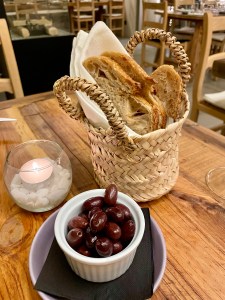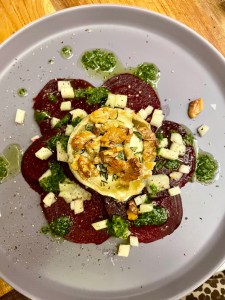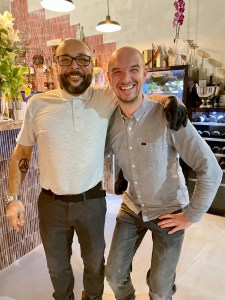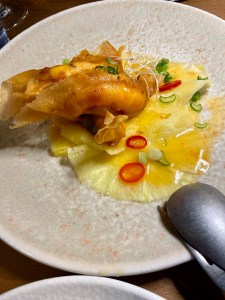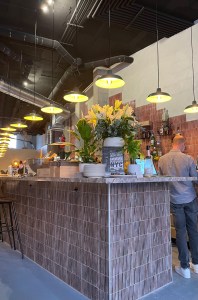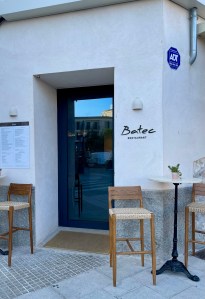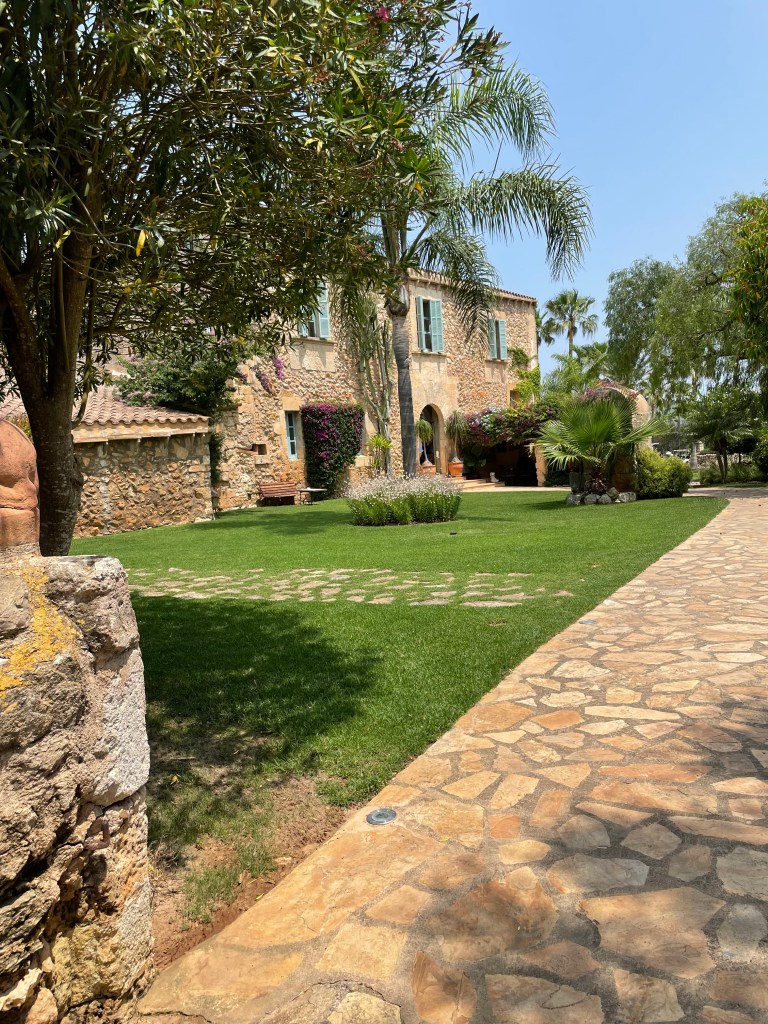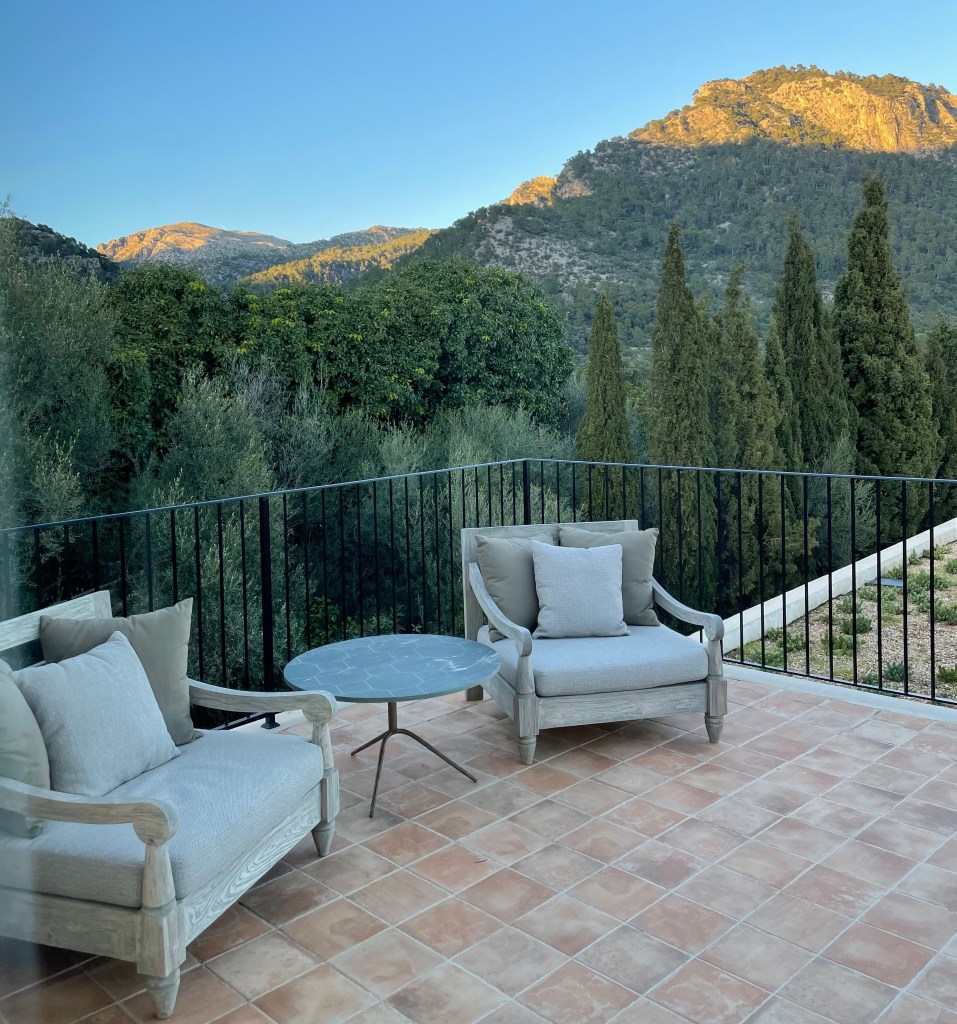-
Mallorca’s Michelin Stars for 2026
The restaurant world equivalent of the Oscars (Academy Awards) are the Michelin stars, and last night was when the new stars for the 2026 edition of the Guía Michelin were announced. The gala event was held in the SOHRLIN Cultural Centre in Malaga – which was hosting this prestigious annual event for the first time. Among the 700 attendees was the Hollywood actor, Antonio Banderas, who was born and still lives in the Andalusian city.
After the awards were announced, some 700 attendees sat down to what must surely have been a sumptuous gala dinner, prepared by three chefs from Michelin-starred restaurants in Malaga. Imagine the pressure of cooking for some of the very best chefs and restaurant management in Spain!
Mallorca’s New Michelin Green Star
Mallorca’s only new starred entry in the 2026 Michelin guide is a Green Star, an award that highlights restaurants at the forefront of the industry when it comes to sustainable practices.
The new Green Star for 2026 is for the Port de Pollença restaurant, Terrae, with Venezuelan chef David Rivas at the helm. He trained in Barcelona and has worked in Norway and Hong Kong, but chose Mallorca as the home for his sustainable restaurant. I’ve yet to try it, but my appetite is whetted by what I’ve discovered about this exciting concept. Congratulations to David and the team at Terrae on their Green Michelin star.
Mallorca’s other restaurants with Green Stars:
Andreu Genestra, Llucmajor
Bens d’Avall, Sóller
Ca Na Toneta, Caimari
Maca de Castro, Port d’Alcúdia
Regular Michelin Stars
There’s no change to Mallorca’s list of Michelin-starred restaurants. Here’s a reminder:
2 stars – Voro, Canyamel
1 star for: Andreu Genestra, Llucmajor; Bens d’Avall, Sóller; DINS Santi Taura, Palma; Es Fum, Costa d’en Blanes; Fusion 19, Playa de Muro; Maca de Castro, Port d’Alcúdia; Marc Fosh, Palma; Sa Clastra, Es Capdellà; Zaranda, Palma.
For a full list of Spain’s Michelin-starred restaurants, visit here.
Jan Edwards ©2025
-
Eat in Spain’s Best Fine Dining Restaurant … in Palma
Not only has Palma’s Izakaya High Japanese Cuisine been named Spain’s Best Fine Dining Restaurant in the Tripadvisor 2025 Travelers’ Choice Awards, but also the Second Best in the World.
Tripadvisor’s annual Best of the Best Restaurant Awards are based on the quality and quantity of traveller reviews and ratings over a full year, as well as an additional editorial process. Izakaya’s success was in the category Best Fine Dining. In the World’s top 10, Izakaya achieved an impressive second place, but it topped the list for the whole of Spain. I had to find out what was key to its success.
Dining at Izakaya
We went for dinner (it’s also open for lunch) at Izakaya and found easy parking in the nearby Marqués de La Sènia underground car park.
Izakaya has several areas for diners: a covered front terrace that’s ideal for drinks, sushi cocktail bar, and what they call the ‘sala’. Our corner table was in the latter, at the back of the stylish restaurant. It’s the perfect area for intimate dinners. Upstairs, there’s a smart VIP room for private dining. The open kitchen on the ground floor gives views of the chefs at work. And judging by the popularity of this High Japanese restaurant, they work hard.



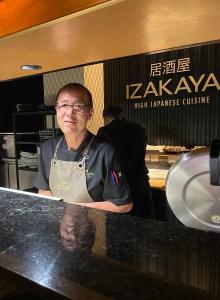
Maître d’ Toni Felix Merino greeted us warmly and showed us to our table. Other members of the service team smiled at us as we passed them – one clue to the restaurant’s success: warm hospitality from personable staff.
Izakaya opened eight years ago but moved to its current location almost two-and-a-half years ago. If you’re wondering about the name, izakaya is the Japanese word for a tavern or pub serving drinks and small plates of food. Take it from me, Izakaya is far more than just a tavern or pub!
The High Japanese Cuisine at Izakaya
Choose from the à la carte and three tasting menus. At lunchtime, there are two additional set menus: the classic for 35€, or the four-step menu for 49€; both include a glass of wine or Japanese beer.
The à la carte menu includes raw-bar dishes, sushi, nigiri, hot dishes, and desserts. We had the eight-step tasting menu (the others have six or nine steps) at 85€ per person. Our ‘steps’ included ‘usuzukuri’ – extra-thin Balfegó tuna belly with truffle sauce, kizami wasabe, sprouts and vegetables, seared scallops flambé with white miso carbonara and crispy air-dried beef. Each one of the menu’s dishes thrilled us with its presentation, flavours, and textures. The following photos are just a few of the dishes we ate.
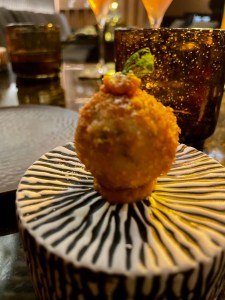

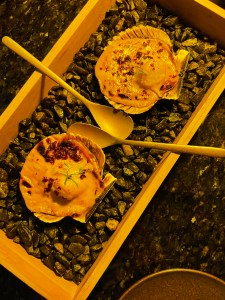

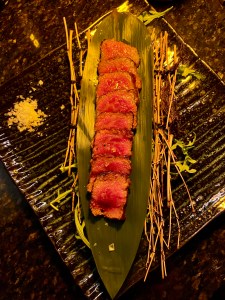
We eat out at least once a week, sometimes more, as I also review restaurants for Mallorca Sunshine Radio, but it had been a long time since I’d seen my husband so enthusiastic about a restaurant experience. At one point in the evening, he took my hand and said, ‘If I were a single man looking to impress someone on a first date, I’d bring her here.’ Praise indeed from him. Guys, take note: it’s ideal for any date night.
The tasting menus don’t include dessert but we decided not to indulge in anything sweet this time, wishing to retain the savoury flavours of what we’d eaten. When I saw the exquisite dessert photos on the website at home later that night, I resolved to make room for a sweet indulgence on our next visit.
Wagyu beef fans can treat themselves here to the highest grade – Wagyu Miyazaki A5 – of the exceptional Japanese beef. Highly recommended, albeit understandably pricey.
The Team at Izakaya
From what we witnessed, the high level of service at Izakaya has also played its part in the restaurant’s success.
Our first encounter was with maître d’ Toni Felix Merino, as I’ve already mentioned. The second maître, Luciano Pastore, is also the knowledgeable sommelier and has a good sense of humour. Two other members of the service team also impressed us.
The kitchen is where the culinary magic happens. Head chef Carlos Piedrabuena leads the team of eleven chefs, with Karol Koper as second chef, and Ezekiel Occhiuzz in charge of the hot dishes. All of them have a high level of Japanese cuisine experience. Masahide Ozawa holds the important and highly respected Japanese position of ‘itamae’, the sushi master.
‘If I were a single man looking to impress someone on a first date, I’d bring her here.’
The BossQ&A with Izakaya’s Owner – Dani Celis
Izakaya’s owner is Dani Celis, originally from Argentina. He previously worked for some years as general manager at Mallorca’s Zhero Beach Club, where he gained experience in high-level service and managing large teams.
EDSM: Dani, why did you decide on a Japanese restaurant?
DC: Japanese culture has fascinated me since I discovered it in 2009. In 2014, alongside maestro Ozawa, I learnt about the flavours and textures of traditional Japanese cuisine, respect for the produce, its aesthetics, and the search for perfection. That’s how my path towards high Japanese cuisine began.
EDSM: What’s Izakaya’s story?
DC: I began preparing the restaurant in 2016 and it opened its doors as a Japanese tavern in March 2017. In July 2023, we took a decisive step and moved to this current location, evolving into the concept of Izakaya High Japanese Cuisine. It’s been a long journey of many hours a day, working with fortitude and constant focus, and overcoming numerous obstacles along the way,
I wanted to create a space uniting Japanese precision with quality and personal service – a restaurant that would tell a true story, where the produce, techniques, service, and experience would be perfect.
EDSM: You’re a hands-on, warm, and energetic proprietor, who spends many hours a week, day and night, in the restaurant. Why is that important to you?
DC: I like to greet diners personally whenever I can. For me, that connection with our clientele and taking care of details with the team make the difference and will continue to be the essence of everything we do at Izakaya.
Eat at Izakaya and I think you’ll understand why it’s received those Tripadvisor Best of the Best accolades.
Jan Edwards ©2025
-
New Michelin Keys for Mallorca Hotels
Last year, Michelin announced a new distinction, for hotels rather than restaurants. The Michelin Key is awarded to hotels that are ‘not simply a room for the night, but offer an outstanding stay’. The Michelin Key hotels are the crème de la crème of the more than 5,000 hotels featured around the globe in their famous guides. The awarded hotels ‘excel in design, architecture, service and personality’. A hotel does not have to have a certain number of stars to be awarded a Michelin Key.
Mallorca now has a total of 22 hotels with the Michelin Key.
The New Keys in Mallorca
Last week, Michelin announced the latest hotels in Spain to gain a Michelin Key, of which three are in Mallorca:
Son Bunyola Resort & Villas in Banyalbufar
Fontsanta Thermal Spa & Wellness, between Campos and Colònia de Sant Jordi
Convent de la Mission Grand Luxury Boutique Hotel – the home of the Michelin-starred restaurant Marc Fosh.
Mallorca’s Other Key Hotels
2 Keys:
Cap Rocat, Cala Blava
Hotel Can Ferrereta, Santanyí
One Key
Es Raco d’Artà, Artà
Sa Creu Nova Petit Palais Art & Spa, Campos
Cap Vermell Grand Hotel, Canyamel
Predi Son Jaumell, Capdepera
Castell Son Claret, Es Capdellà
Can Bordoy Grand House & Garden, Palma
Es Princep, Palma – home of the Michelin-starred restaurant, Zaranda
Sant Francesc Hotel Singular, Palma
Boutique Hotel Posada Terra Santa, Palma
Castillo Hotel Son Vida, Palma
El Llorenç Parc de la Mar, Palma – home of the Michelin-starred DINS Santi Taura
Nobis Hotel, Palma
Son Brull Hotel & Spa, Pollença
Hotel L’Avenida, Sóller
Jan Edwards ©2025
-
Treat Yourself to a Spa Day & Lunch in Palma
There’s nothing quite like a spa experience to help you unwind and benefit from some time away from tech screens and other distractions. If your holiday accommodation in Mallorca doesn’t have a spa, or you’re an island resident who wants some time out, the website Hotel Treats is worth a look.
Two of my girlfriends and I recently bought our first Hotel Treats’ spa pass and lunch. Our chosen hotel was Palma’s smart, contemporary-style 4-star HM Palma Blanc. Although the spa had been recommended to us, it was the prospect of another lunch in the hotel’s Restaurant Aromata that really excited me. I’d eaten there before and it has been my Restaurant of the Week for Mallorca Sunshine Radio.
There were two options for the Gourmet & Relaxation Experience at HM Palma Blanc: 90 minutes of spa time plus a three-course lunch in Aromata for 55€ or the same with the addition of a 25-minute massage for 95€. One of my friends opted to include a massage. (She was able to change the latter to a different date to maximise our time together).
I booked for the three of us through the Hotel Treats website, receiving a swift payment acknowledgement. The next day I had another email from them advising that the booking wasn’t confirmed until I received notification from the hotel. Shortly afterwards, the hotel emailed me to request the times for our arrival, my friend’s massage, and our lunch in Restaurant Aromata. I was impressed by the reception staff’s efficiency and helpfulness, both before our visit and on the day itself.
The Spa
The HM Palma Blanc spa is one floor below ground level, with lift and staircase access. Facilities include a large swimming pool, jacuzzi bath large enough to accommodate quite a few people, sauna, steam room (Turkish bath), and two treatment rooms. A water-cooler machine next to the pool dispenses free water. For further relaxation, there are seats and bed-style loungers. There’s also a gym, but exercise was definitely not on our agenda. The spa assistant gave us each a robe and a towel.
Wanting to respect the privacy of other spa users, I left my phone in my changing room locker and requested images from the hotel – shown below. In fact, there was only one other person in the spa at midday, so we enjoyed the facilities almost to ourselves.



My only suggestion to improve the main spa area would be a wall clock for users who need to keep an eye on the time.
Lunch in Aromata
Aromata belongs to the Mallorcan chef, Andreu Genestra, whose eponymous Michelin-starred restaurant is in Llucmajor. His head chef at Aromata is Edgar Rodríguez, who moved here from the Canyamel hotel, Can Simoneta. Before that, he’d worked in Restaurant Andreu Genestra’s original location, Capdepera, where I first met him when reviewing that restaurant. Edgar is a talented young chef, with an eye for detail and presentation.
On this visit, we were able to sit in the peaceful, verdant courtyard, where it’s easy to forget that you’re in the bustling city of Palma.
Aromata offers a set lunch menu – the Menú Migdia – which starts with snacks, followed by three courses (with choices), and ends with petits fours. This menu costs 38€, without drinks. The delicious breads, EVOO, and home-made flavoured butter cost an additional 4€. I believe this fine-dining experience is excellent value for money.
The wine list offers plenty to please enthusiasts but, if like us, you just want wine by the glass, you could try one of Andreu’s own wines. Red, rosé, or white Genestral costs 7€ a glass. As we were treating ourselves on the day of our spa visit, we drank the recommended Oliver Moragues’s Giró Ros (12€ a glass).
Our lunch impressed my friends (it was their first visit to Aromata). For me, it’s a major bonus point that the hot food is served on warmed plates/bowls here – something that doesn’t happen often enough in Mallorcan restaurants. And the exquisite presentation is also noteworthy. It goes without saying in a restaurant of the quality of Aromata, that that the service was impeccable.
Below are photos of some of the dishes on the midday menu on the day we visited.

Tables in the courtyard 
One of our two snacks 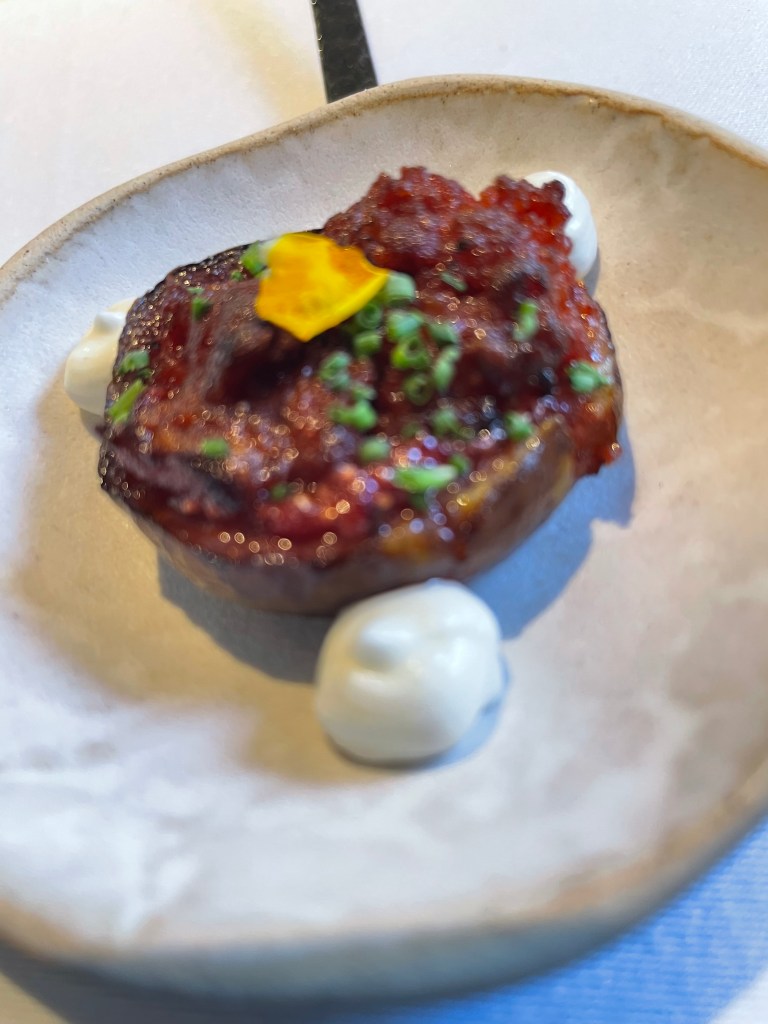
The second snack 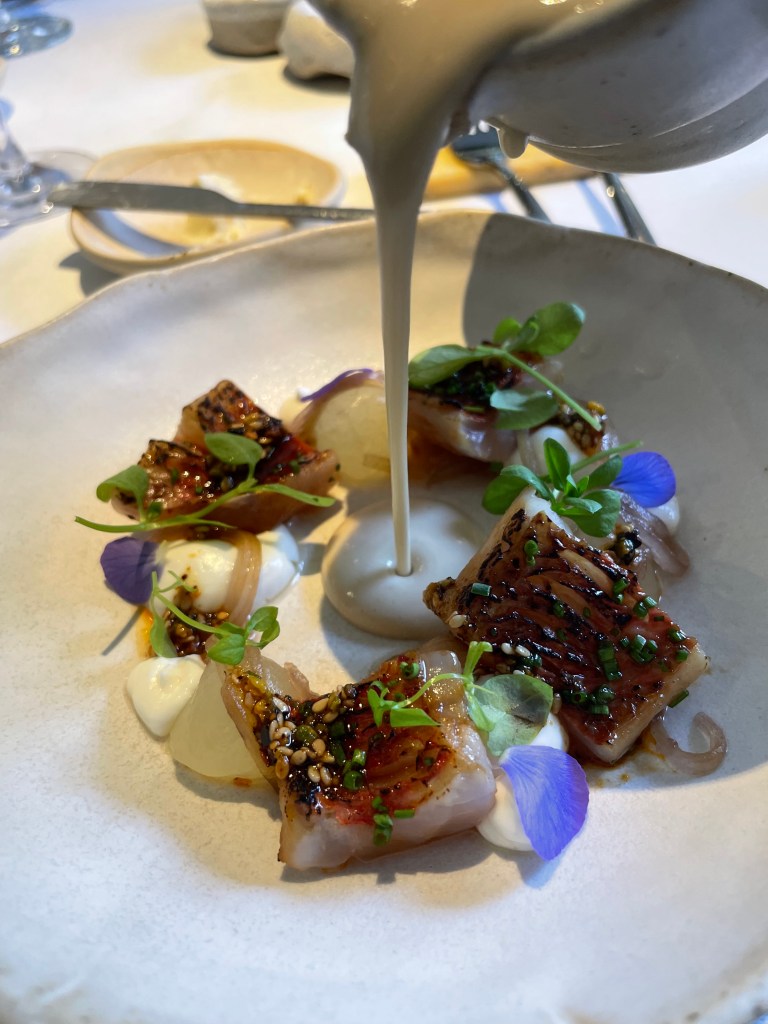
Peanut ajoblanco with red mullet and pickles 
Smoked aubergine rice with sobrasada and pears 
Confit amberjack, cauliflower, Mahón cheese, and almonds 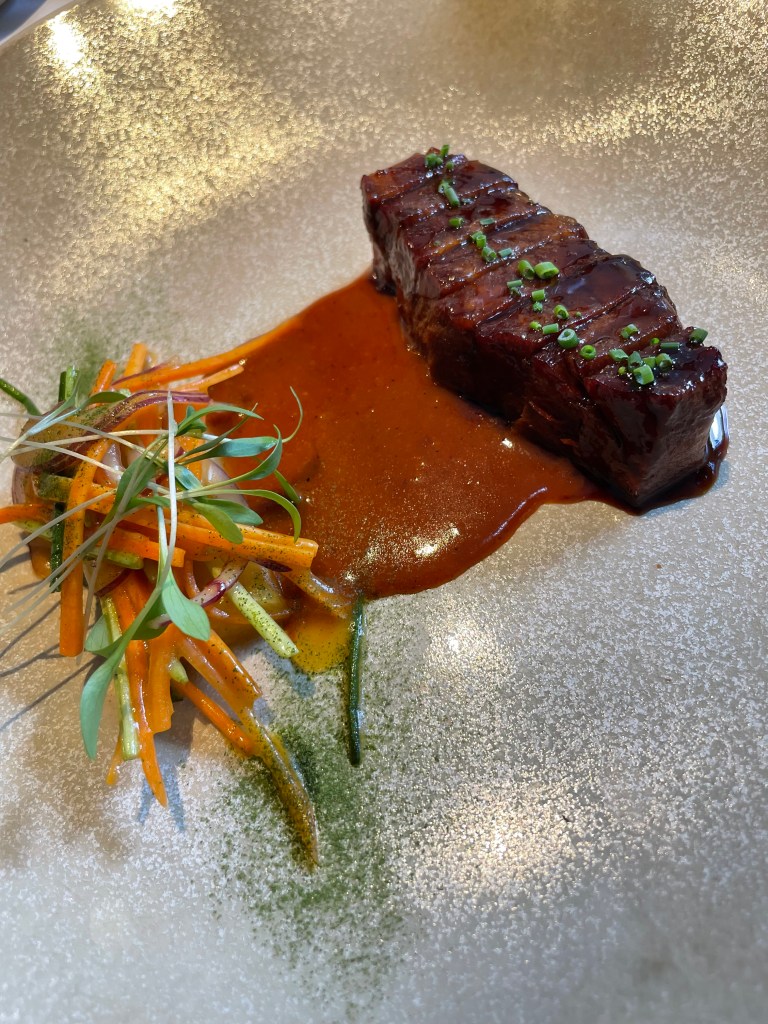
Marinated Iberian pork with grilled pineapple and siem salad 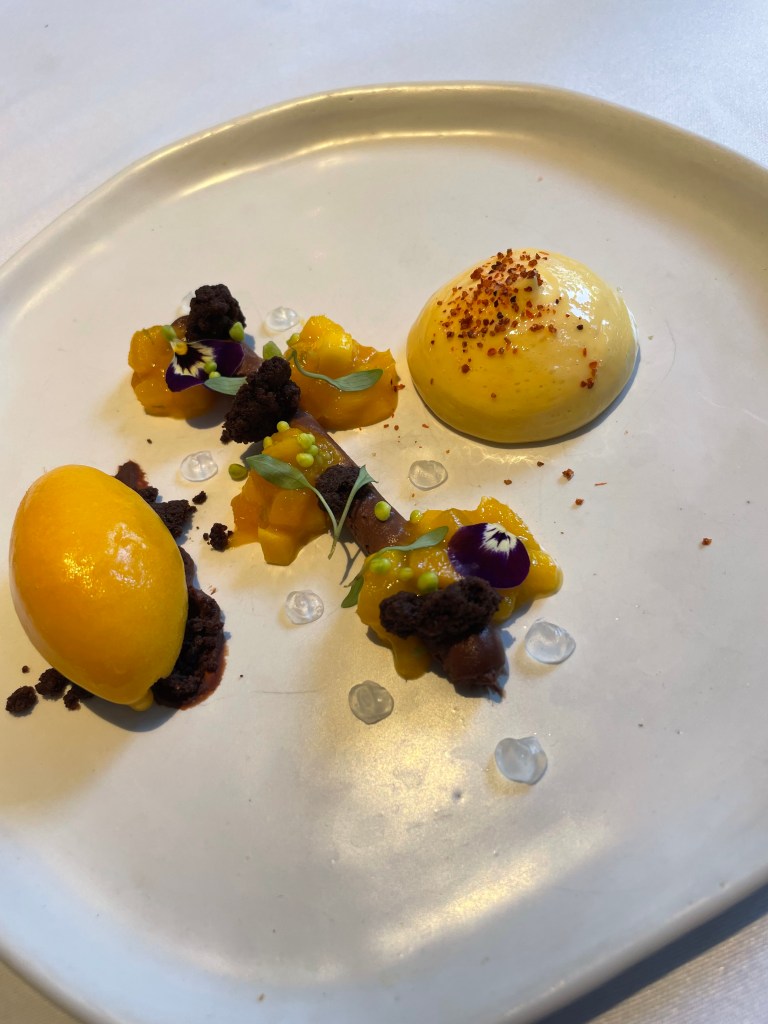
Mango, passion fruit, dark chocolate and chilli 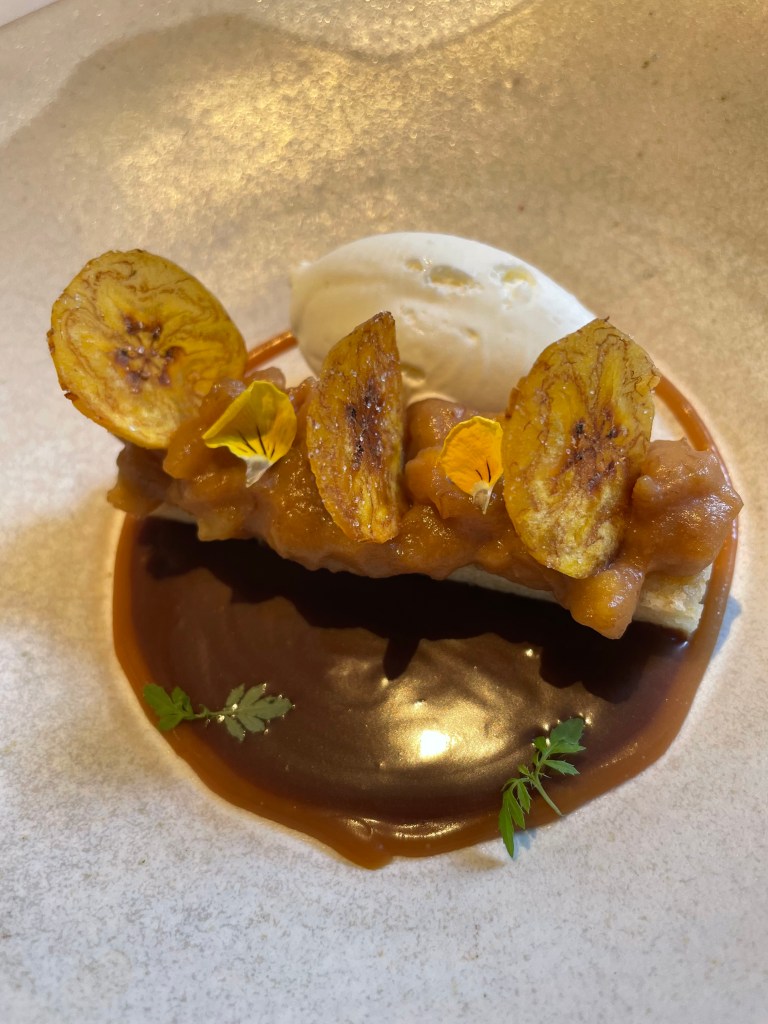
Banana, salted caramel, and cream 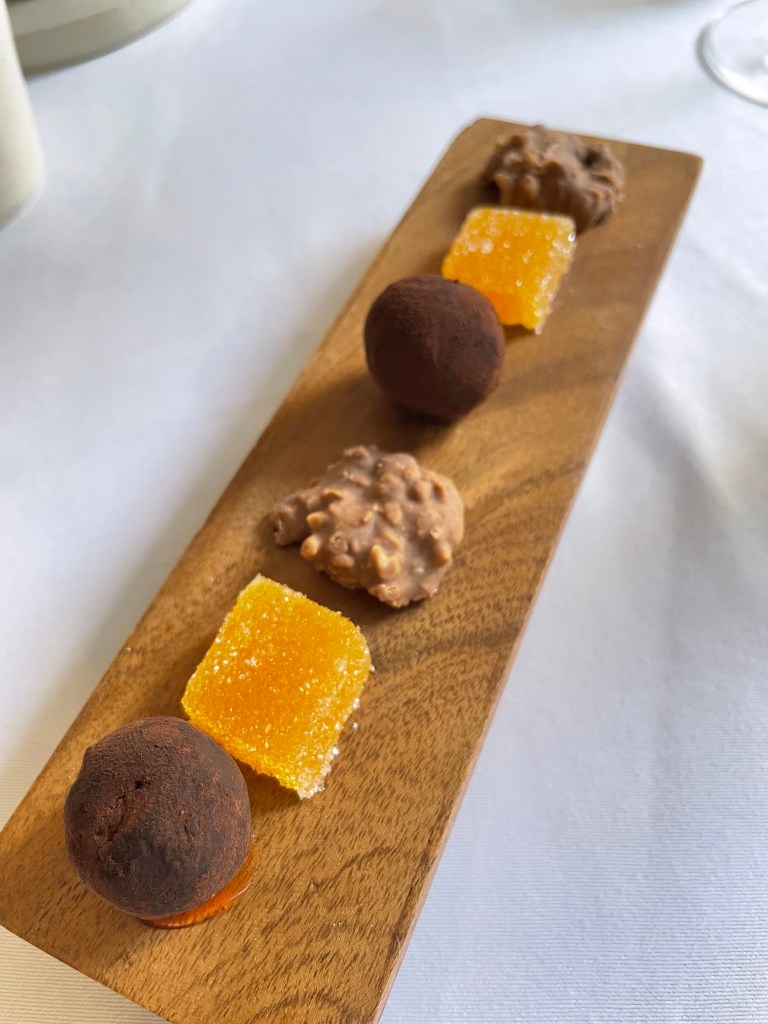
Petits fours 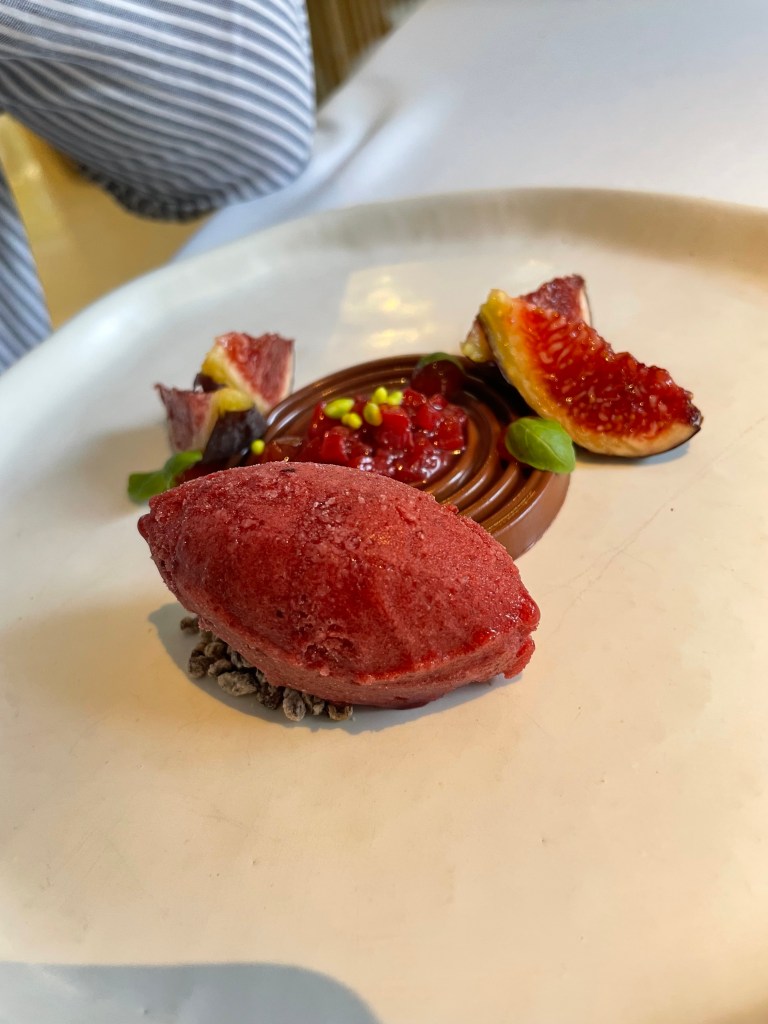
Alternative dessert for one of my dairy-intolerant friends We loved the cuisine, Aromata’s ambience, and the spa. If you want to treat yourself to some relaxation and fine cuisine, Hotel Treats’ Gourmet & Relaxation Experience at HM Palma Blanc could be for you.
Jan Edwards ©2025
-
Escape the Crowds in a Rural Hotel Restaurant – Part Two
Here are three more rural hotels in Mallorca with restaurants that I recommend.
Jacaranda
This is the restaurant of the 5-star Finca Serena, the appropriately named rural hotel near Montuïri, in the heart of Mallorca. The estate covers some 40 hectares that are home to vineyards, more than 800 olive trees, and fresh-produce plots, but also plenty of space for walking, jogging (if you’re so inclined), and soaking up the peace and beauty of the surroundings.
Jacaranda restaurant is also open to the public for lunch and dinner. In fine weather, you can eat al fresco and savour the extraordinary views as well as the food. Lunch on the front terrace offers a view of the mountain known as Randa and the countryside. For dinner, the rear terrace gives you a view of the sun setting behind the Serra de Tramuntana. There is also an attractive dining room.
Lunch and dinner menus are different, with an à la carte menu at lunchtime. For dinner, there’s a three-course menu (with choices).






Jacaranda has been my Restaurant of the Week for Mallorca Sunshine Radio You can read my full review here.
STOP PRESS:
Finca Serena’s Único Spa has just been named Spain’s Best Resort Spa for the second consecutive year.
Singular
Singular is the restaurant of The Lodge, located in the countryside near the town of Sa Pobla – a fertile area known for its agricultural produce. Like Finca Serena, The Lodge ( a 24-room, 5-star hotel) is part of Spain’s Único Hotels group.
Chefs in Mallorca may have a wealth of hi-tech kitchen equipment available to them but the oldest way of cooking – over a wood fire – is hard to beat for enhancing the flavour of food. Singular, a restaurant in the countryside near Sa Pobla, has made ‘cocina del fuego’ its speciality, serving lunch and dinner by reservation only to the public as well as hotel guests.
Wood from the estate’s numerous almond, olive, carob, and Holm oak trees, adds subtle nuances to the taste of the food cooked here. The estate also produces fruit, vegetables, and honey for the kitchen, which sources additional seasonal and high-quality produce from local farmers and fishermen.
Wines are from the island and beyond and include those made from native Mallorcan grapes, grown in the vineyards at The Lodge’s sister hotel, Finca Serena.
Singular restaurant has an attractive dining room, with simple but stylish décor; at night the space is elegant and relaxing with soft lighting and candlelight. In summer, lunch or dinner on the large terrace is a must
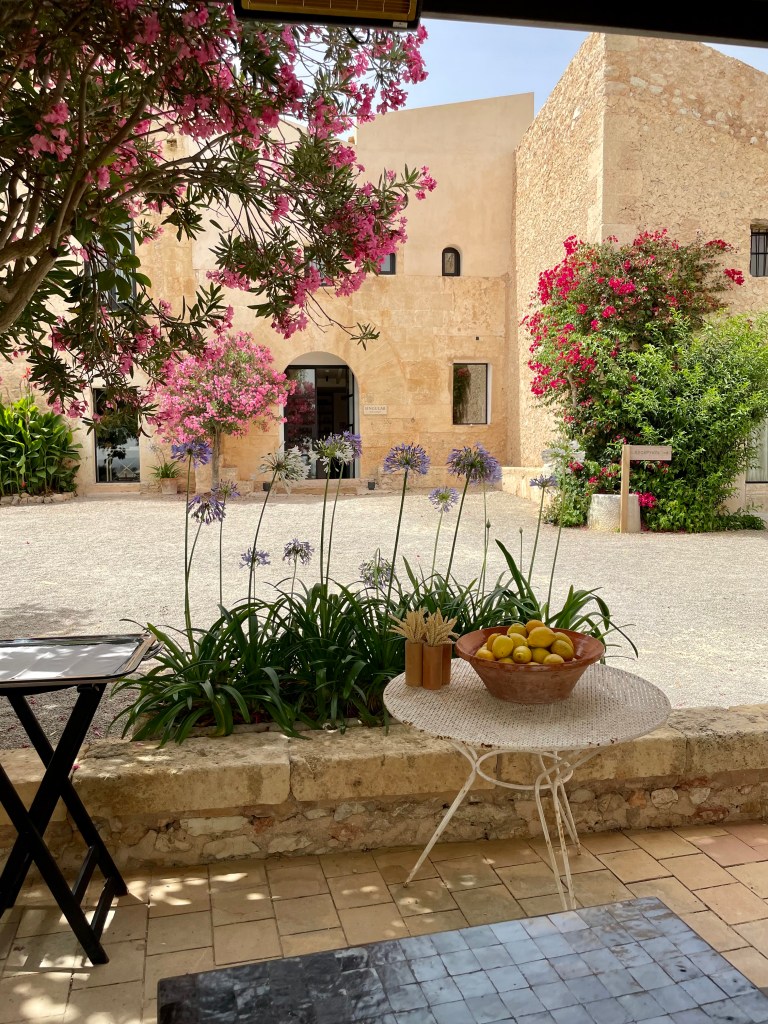

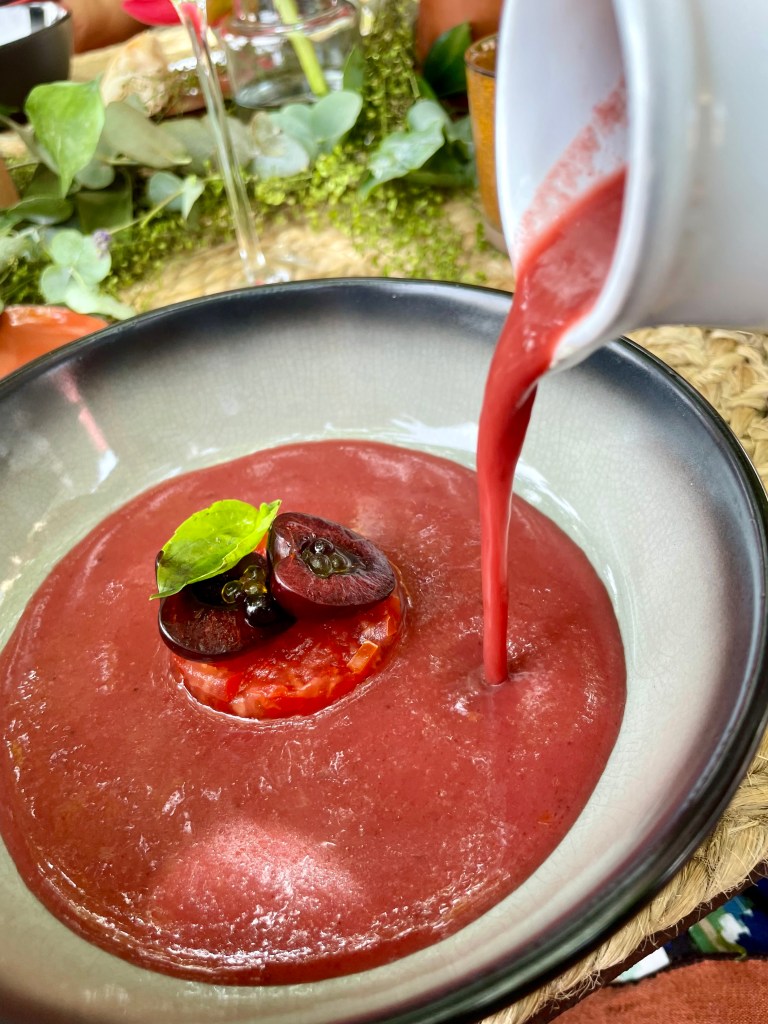
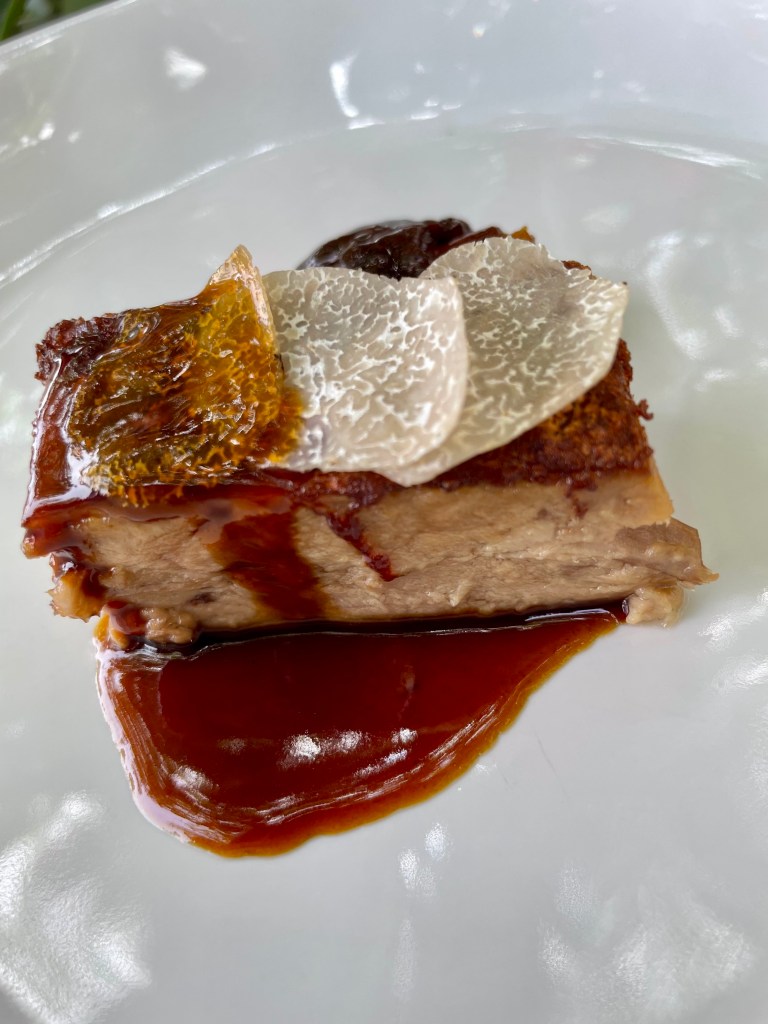

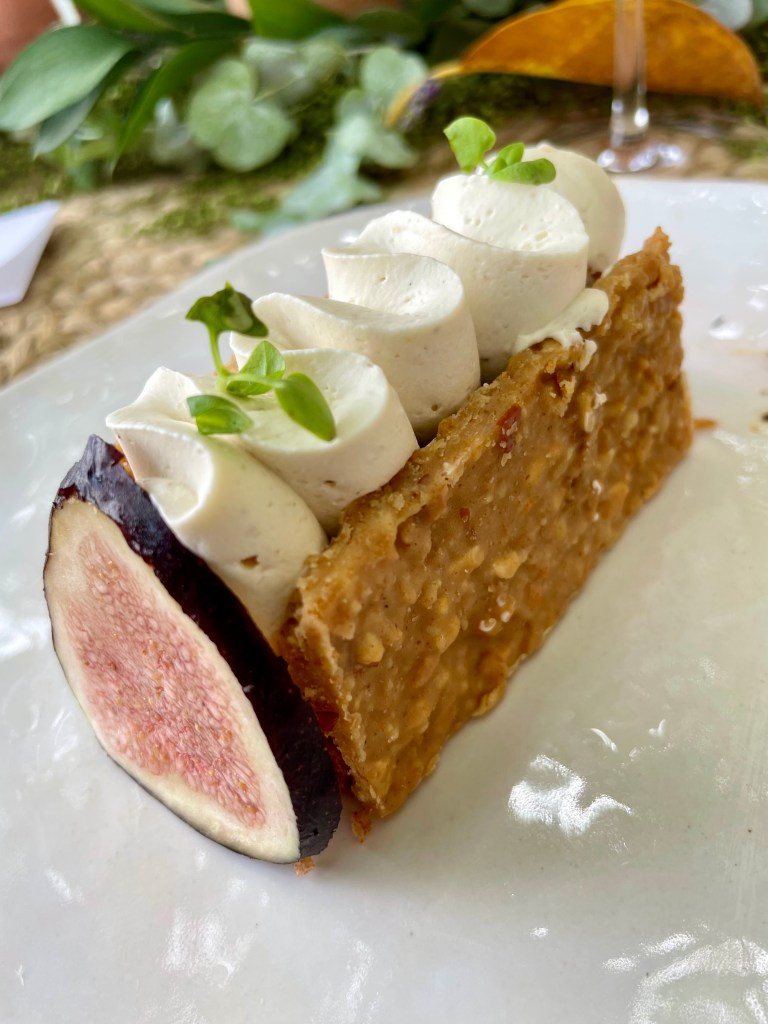
Rotana La Reserva
The change of the hotel name from La Reserva Rotana to Rotana La Reserva followed the sale of this beautiful 5-star golf (nine holes) hotel in the fertile Sa Vall area on the outskirts of Manacor.
The hotel is now under Singaporean ownership and I expect the forthcoming renovation of the hotel to be impressive when it re-opens in 2026. This year the hotel will close on November 3rd but in future Rotana La Reserva will be open all year – great news for golfers.
Our favourite place to eat at Rotana La Reserva is on the bistro terrace, with its gorgeous sunset views during the summer. There’s an indoor dining room (in which we’ve never eaten) and a beautiful courtyard, where we enjoyed a Japanese-themed dinner this summer.
At lunchtime, in addition to the à la carte menu, you can choose from a three-course menu at 36€ (without drinks). For dinner, there’s a different three-course menu costing 56€. The Rotana estate also produces its own-label wines.
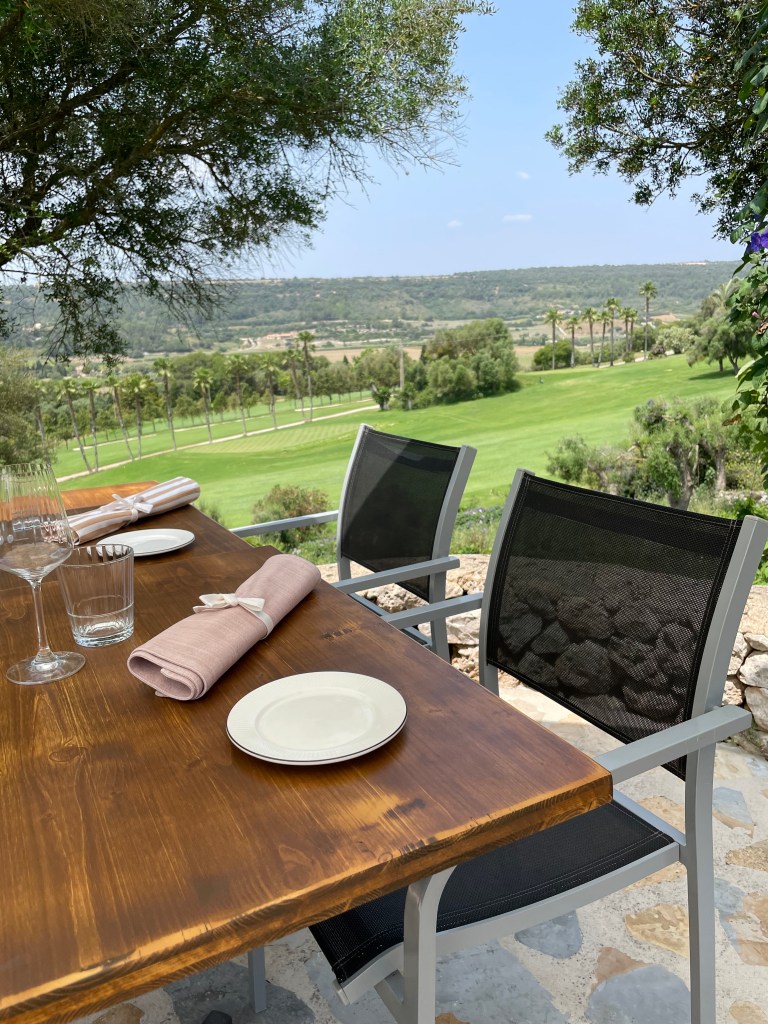

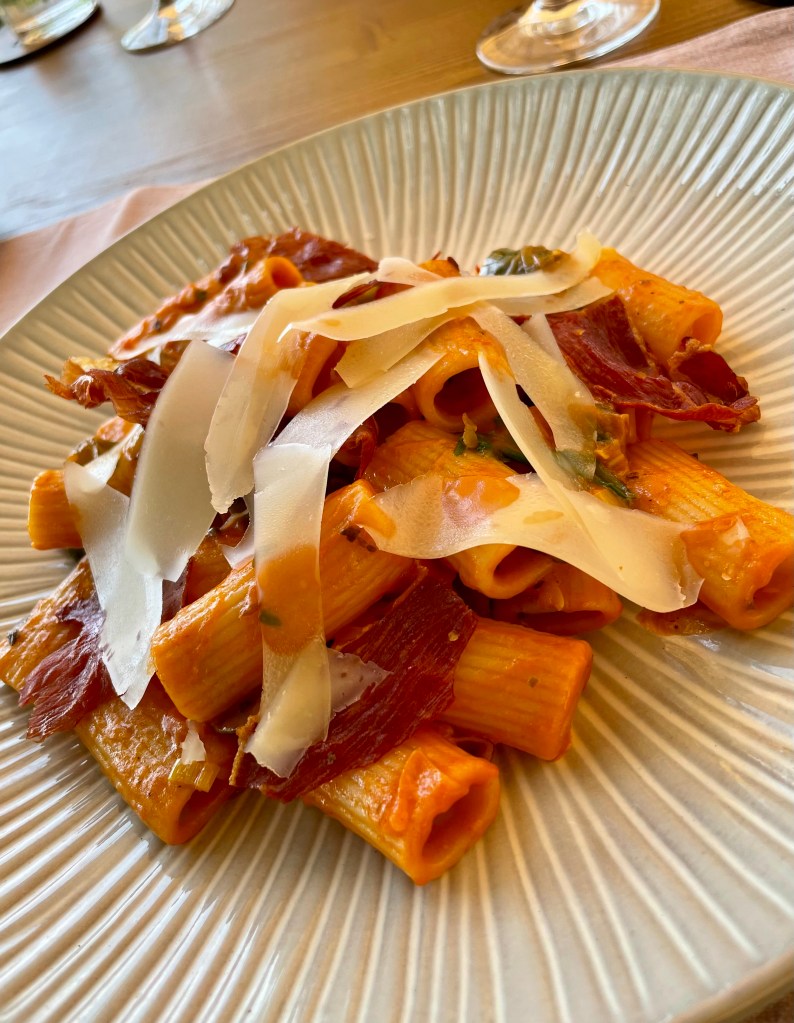



Jan Edwards ©2025
-
Escape the Crowds in a Rural Hotel Restaurant – Part One
I’ve become such a country girl since we moved to rural Mallorca in 2004. Although I love the buzz of eating out in Palma and the pleasures of a seaside restaurant, sometimes I crave the tranquillity of eating in a rural restaurant. There’s something about hearing birdsong and cicadas along with the soft buzz of conversation and gentle sounds of cutlery meeting crockery that soothes my soul.
Here are some of my recommended rural restaurants – all located in hotels – where you don’t have to be staying overnight to eat.
Mirabona, Binibona






Mirabona, the restaurant of the hideaway retreat Can Beneït in Binibona, is a blissful haven from the buzz of summer in Mallorca. Its elevated terrace offers panoramic views – yes, that is the Mediterranean in the distance – and a carefully tended orchard and vegetable garden. This is farm-to-table eating in style, with the cuisine of head chef Raúl Linares Pinzón, accompanied by a cracking wine list curated by sommelier Amy Dunn.
Miranona is open all day every day, from 1pm until 10.30pm.
Check out the seasonal menu at Mirabona here. A tasting menu is also available.
De Tokio a Lima, Valldemossa

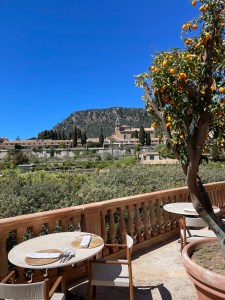
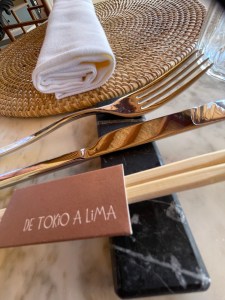
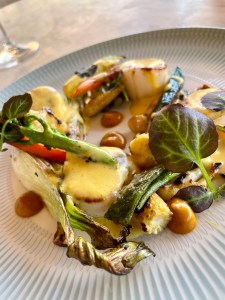
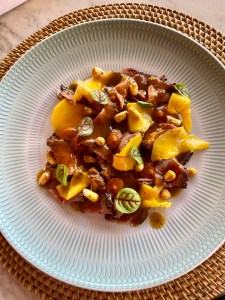

There’s a De Tokio a Lima restaurant in the heart of Palma, but also a rural ‘branch’ offering the same menu and prices within the adults-only Hotel Valldemossa, part of the IT Mallorca portfolio of boutique hotels.
You’ll have good views from the dining room or whichever of the two terraces you choose. One faces La Cartuja, where Chopin famously spent a winter.
The cuisine is a creative fusion of Japanese, Peruvian, and Mediterranean influences, prepared by chef Ricardo Rossi. Open for lunch and dinner with an à la carte menu and a tasting menu with Veuve Clicquot champagne. Diners can use Hotel Valldemossa’s car park during their restaurant visit.
5’S, Sant Llorenç
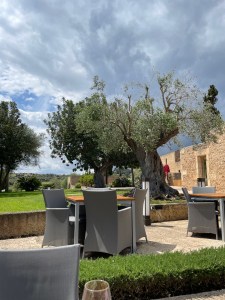


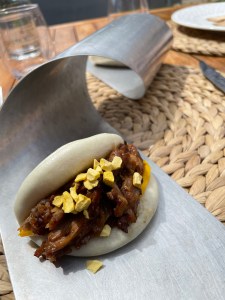
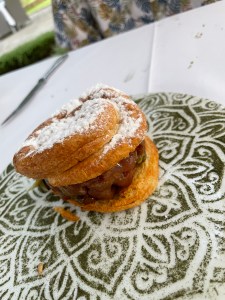

The restaurant of the adults-only Son Penya Petit Hotel, 5’S offers creative cuisine from chef Gabriel Nebot, who’s worked at the hotel for almost twenty years.
The restaurant name 5’S is an abbreviation of 5 Sentidos or ‘five senses’. Chef Nebot’s signature Mediterranean cuisine with Asian touches, based on seasonal local produce, is designed to appeal to each of those senses. In fine weather, eat on the terrace, gazing at the surrounding countryside and enjoying the serenity and the birds singing.
Although it may feel miles (or kilometres) from anywhere, Son Penya Petit Hotel is just a few minutes’ drive from the Sant Llorenç roundabout on the Ma15.
Part two is to follow.
Jan Edwards ©2025
My author website.
-
Seek out Sanctuary in Valldemossa
For anyone who’s visited this famous village, finding sanctuary when the streets are crowded with tourists sounds a little unlikely. But the sanctuary I’m thinking of is in a place of tranquillity and natural beauty on the edge of Valldemossa.
Hotel Valldemossa describes itself as a natural sanctuary. This adults-only 5-star hotel reopened last summer after the IT Mallorca group of hotels acquired and renovated it. Five-star hotels with spa facilities are in abundance in Mallorca, but the Sanctuary very much has its focus on holistic health and wellness, and offers some treatments that are unique in Mallorca to this hotel.
Amor Garzón
The team dedicated to your well-being is led by Amor Garzón. Her first name is the Spanish word for ‘love’, and it seems appropriate for someone who radiates warmth and caring. From the moment I arrived until she escorted me, walking arm-in-arm, back to the hotel terrace where I was meeting a friend for lunch in the restaurant, De Tokio a Lima, I was happy to surrender myself to her ministrations. I’d arrived slightly stressed from the drive across Mallorca from my home, but left for my lunch date feeling almost euphoric.
Amor has some twenty-five years’ experience in the health and beauty sector, although I had to confirm that I’d understood that number of years correctly, as she looks too young. Presumably, she also applies her knowledge and techniques to herself, making her a walking advertisement for the Piroche Method, of which she was a pioneer.
The Piroche Method
Hotel Valldemossa’s Sanctuary is the only place in Mallorca offering treatments using the Piroche Method, which combines Traditional Chinese Medicine with Western lymphatic drainage. It involves drainage and manual massage, essential oils (the aromas are gorgeous), and the use of electric cupping therapy and radio frequency. Treatments are tailored to the individual. Amor also uses acupuncture, although I’m a coward and shy away from needles – however fine they may be!
Amor first ‘reads’ the body, using her eyes and hands. It didn’t take her long to diagnose wind in my liver, which in Chinese medicine refers to disharmony in the organ, disrupting its natural movement and function. This ‘wind’ had nothing to do with digestive gases, but is a metaphor for an imbalance that can result in tremors, spasms, dizziness, and other movement-related issues.
After a couple of hours of Amor’s treatments, I felt lighter and more relaxed – both physically and mentally.
As I lay on the couch, I couldn’t help but wonder why there appeared to be ladders mounted on the ceiling. Something to do with a fire exit perhaps? No. Once my session was over, Amor took me into another treatment room and demonstrated a back massage using her feet on one of her colleagues. Mystery solved.
Other Treatments
There’s a variety of treatments on offer in the Sanctuary, some of them bearing Amor’s name. I’ve provided a link to the treatment list below. You can also have a nutritional analysis carried out here.
I like the look of the Rituals on offer, for one to five days (three-and-a-half hours’ treatments a day). These Sanctuary sessions, combined with staying in the tranquil setting of Hotel Valldemossa, would surely leave you feeling like a new – or at least renewed – person.
See the 2025 Sanctuary treatment menu here.

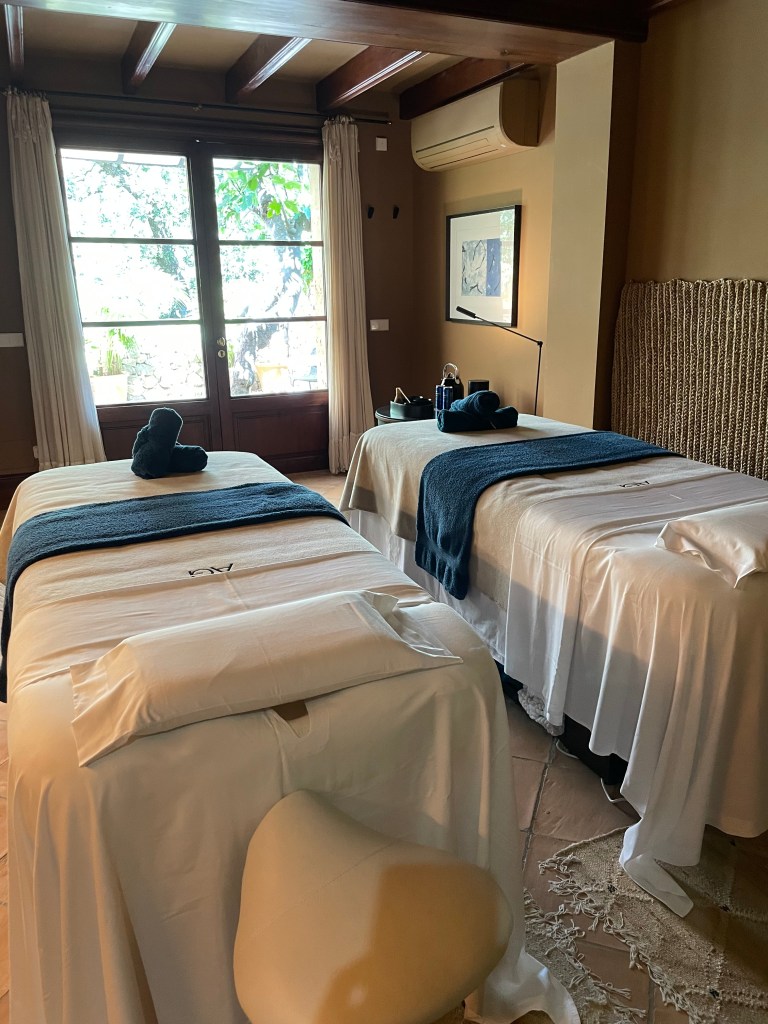



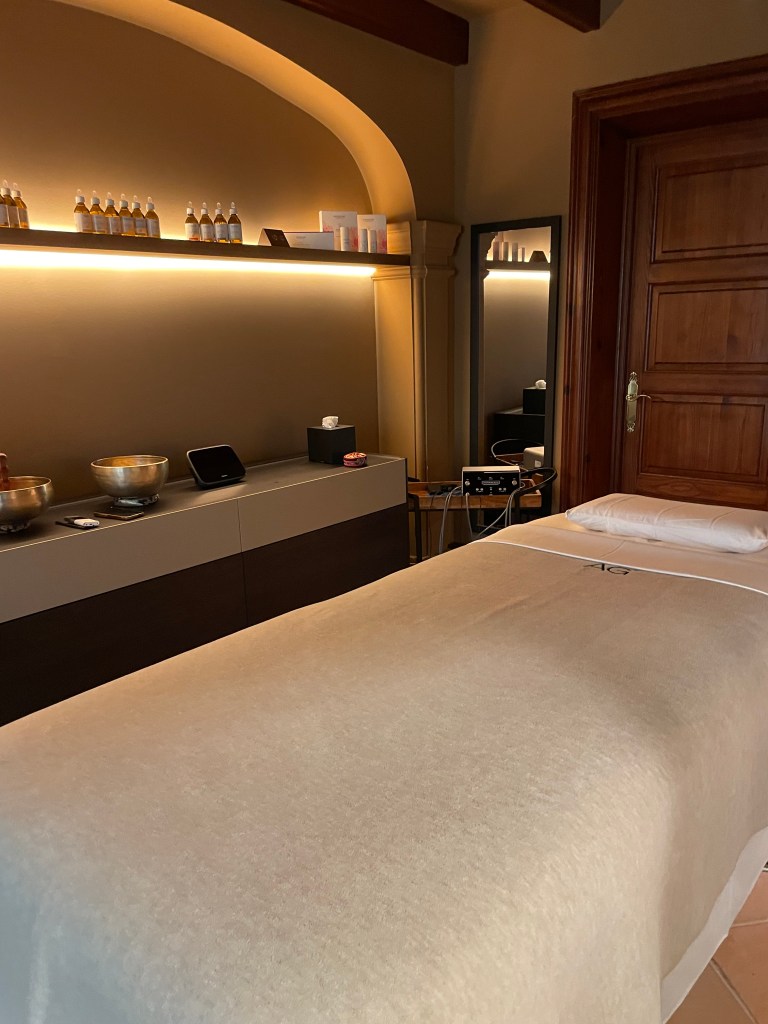

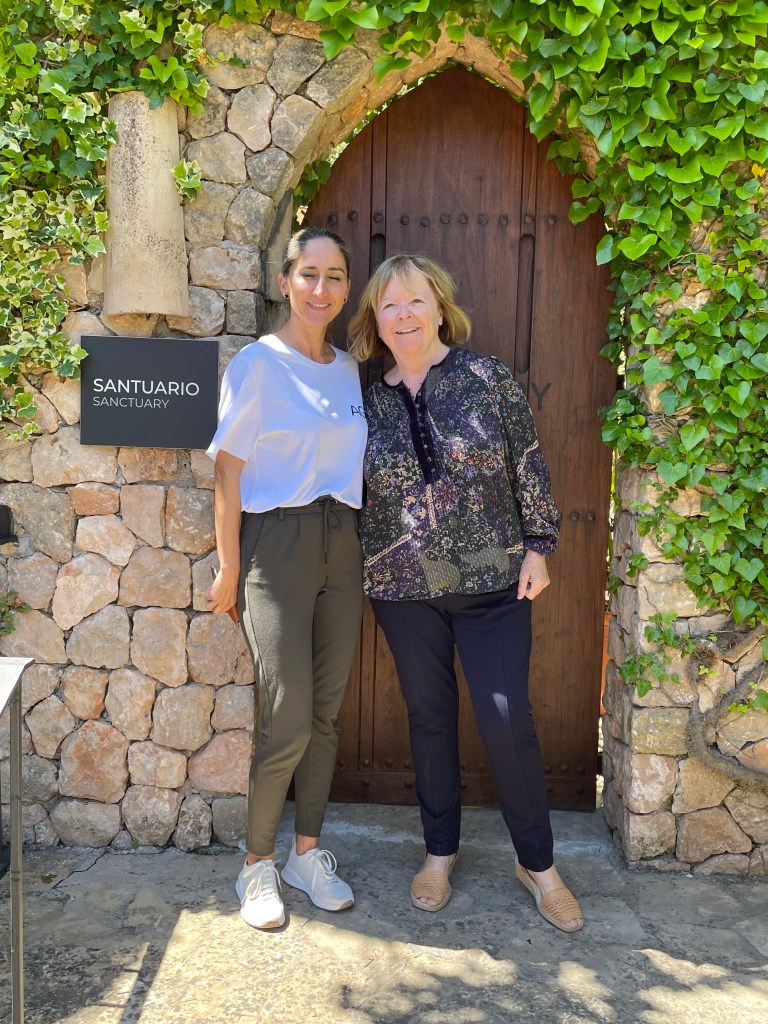
Jan Edwards ©2025
-
What’s New at Rotana La Reserva in 2025?
For a start, the change of name to Rotana La Reserva from La Reserva Rotana. It’s subtle but significant: the 5-star hotel with a nine-hole golf course and vineyards near Manacor has new owners (a family from Singapore).
New management is also in place, led by experienced hotelier Giovanni Merello – whom I first met when he opened Palma’s 5-star Can Bordoy Grand House & Garden. He’s directed eight new openings and managed projects in Spain, Italy, Egypt, and China, working for private luxury hotels and international luxury groups.
Some exciting developments are planned to make Rotana La Reserva a true resort, without detracting from the much-loved soul of the place. Expect a choice of restaurants, a spa, and more. One change made already that pleased me: the hotel lounge/bar is no longer decked out inexplicably like an African safari lodge; the wall-mounted hunting trophies are consigned to the past.
There’s good news for those who’d like to play golf at Rotana La Reserva during the cooler months: from 2026, the hotel will be open all year. This year, however, Rotana La Reserva will close on November 3rd for renovations and some super enhancements.
The Food (and Drinks)

A table on the bistro terrace with the outdoor kitchen behind 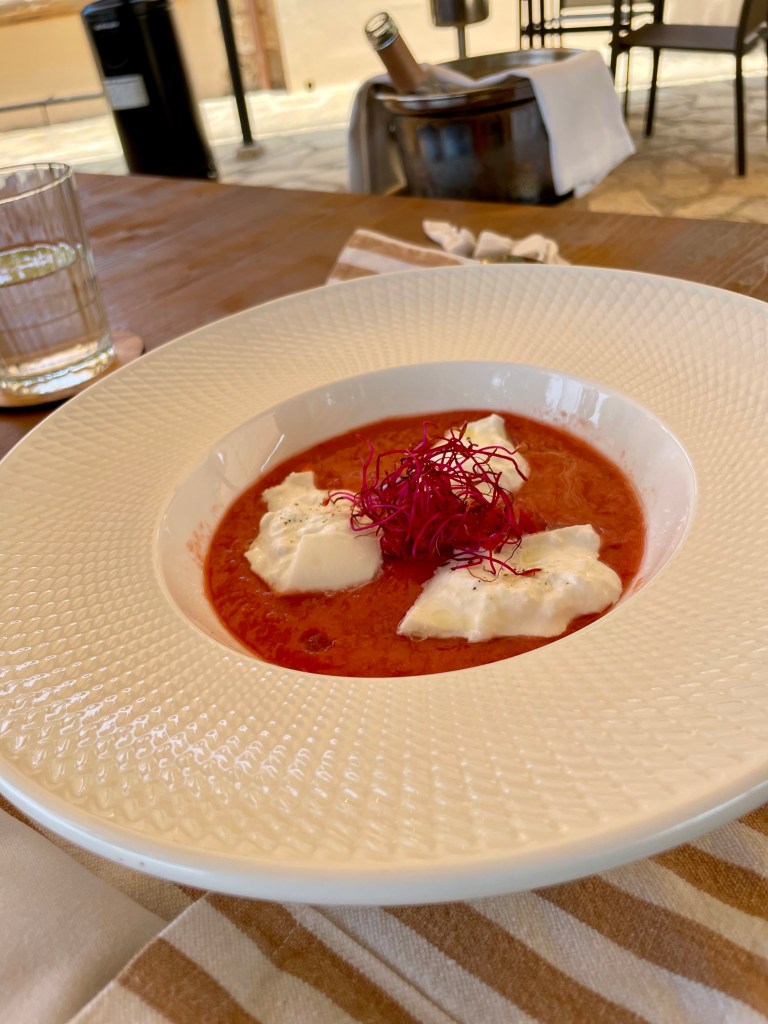
Tomato and strawberry gazpacho with chopped vegetables and burrata 
Rigatoni with chard, courgette, crisped Serrano ham and ribbons of Parmesan cheese We recently ate lunch on the bistro terrace, enjoying the three-course daily set lunch menu (36€), that’s available seven days a week. It’s worth noting that the finca provides the kitchen with fresh produce and its own extra virgin olive oil. For me, a table on this terrace, with its glorious views of the golf greens and the Sa Vall valley below, is the perfect summer-lunch place. Dinner on this terrace is à la carte but we’ve yet to try that.
We also recently attended the first of several Asian-themed evenings planned (there’s an Asian chef on the kitchen team), on the pretty partly-covered patio behind the main restaurant. This will become a fine dining area for five-course dinners. Several events are planned at Rotana La Reserva for this season, so it’s worth following the hotel on Instagram if you’re on that platform, for details.
Pierre Emmanual Vogein is the new executive assistant manager, in charge of food and beverage. He’s moved from Finca Serena in Mallorca, another hotel with its own vineyards and wines.
I love the changes I’ve seen so far and am excited to see how Rotana La Reserva, near Manacor, will develop. And, of course, we’ll be taking advantage of its proximity to home for summer meals out.
Jan Edwards ©2025
-
Suite Treats: Panorama Suite at Ca’n Beneït, Mallorca
I’ve written about Ca’n Beneït in Binibona before because it’s my favourite small rural hotel in Mallorca. I love the people who work there, the surrounding countryside of the Serra de Tramuntana foothills, the handsome ginger cat, and so much more.
We’ve stayed in several of the rooms and suites but for our latest visit – in February – we were in the Panorama Suite, which truly lives up to its name, being on the top floor of the main house.
Completely refurbished in 2024, this is the suite for you if you enjoy privacy, exceptional views, and somewhere you can feel away from it all. Climb the stone staircase to the Panorama Suite and you’ll find a sitting room, spacious bathroom (with bath and shower), and large bedroom with access to the terrace.
The Sitting Room
Like the rest of Ca’n Beneït, style and the thoughtfulness that went into enhancing the guest experience shine through. There’s a comfortable sofa, a rocking armchair, a smart TV, desk, a minibar with complimentary items, and coffee and tea-making facilities with daily replenishment of supplies (note the compostable capsules).
I particularly liked the telescope provided because this part of Mallorca is great for star-gazing, with its unpolluted night skies, and the terrace is the perfect spot for it. Book lovers will appreciate the gorgeous coffee table books.
The sitting room of the Panorama Suite, Ca’n Beneït The Bathroom
A spacious bathroom with an attractive oval bath, separate shower cubicle, loo, bidet, and washbasin. There’s plenty of room for an enthusiastic drying session with those supersoft Spirit of the Nomad towels, made from Egyptian cotton. The amenities are from the luxury brand Natura Bissé.
And So To Bed
A huge, comfortable bed awaits you, dressed with Spirit of the Nomad bedlinen, along with a second smart TV and rocking armchair. If you’re staying for a week or longer, you’ll find plenty of storage space.
The bedroom of the Panorama Suite, Ca’n Beneït The Terrace
This is not overlooked and has commanding views of the Tramuntana mountains, Ca’n Beneït’s swimming pool, and the roof garden over the spa area below.
New at Ca’n Beneït: La Villa
Ca’n Beneït has unveiled a private villa for this summer: La Villa is some 30 metres from the main building and has its own private pool, three double bedrooms, three bathrooms, an open kitchen with a central island, and dining and living areas. When can I move in? Seriously, although I haven’t seen this addition to Ca’n Beneït, I know it’ll be beautiful. See photos on Ca’n Beneït’s website. And if you book it, it would be kind of you to mention this blog, please.
My Second Novel Out Soon!
I’ve not posted as much here recently as I’ve been working on completing my second novel, ready for publication in a few weeks. The Mallorca Cat Café is the sequel to Daughter of Deià but also works as a standalone novel. Given my love of Ca’n Beneït, you may not be surprised to learn that the hotel gets a mention.
©Jan Edwards2025







